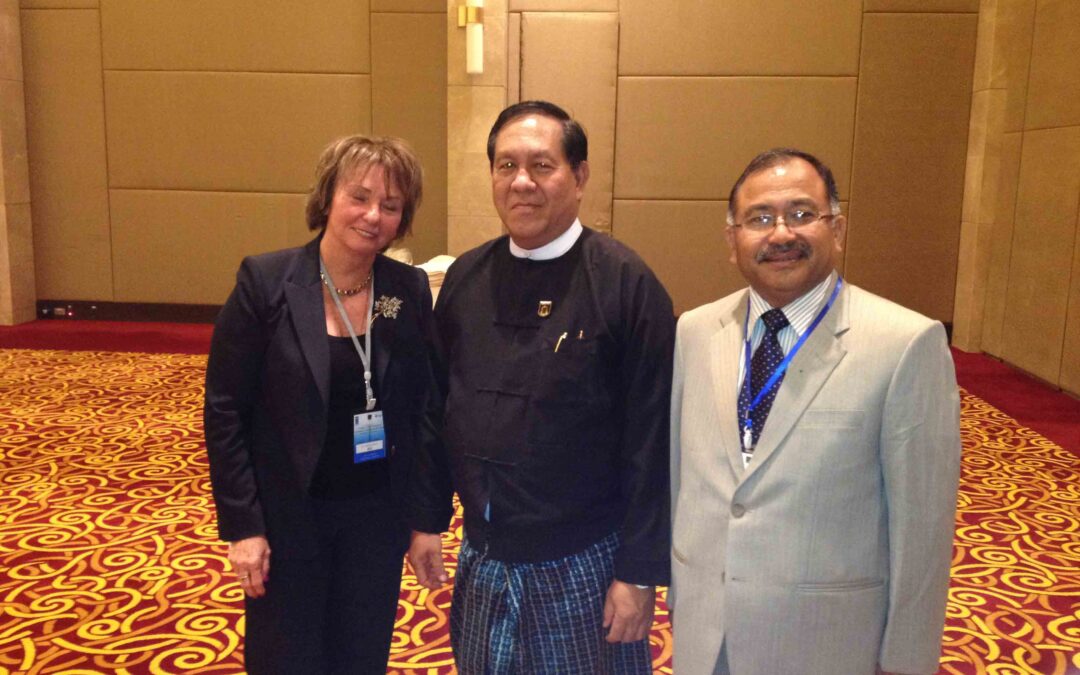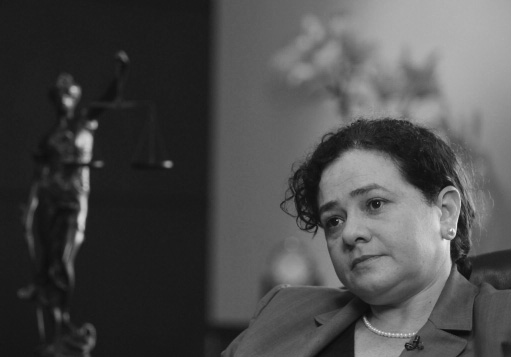
Feb 11, 2014 | News
The seminar was on “The Role of Judicial Independence and Integrity in Improving the Effectiveness of the Rule of Law”, with the participation of the ICJ.
The event, hosted by the Office of the Supreme Court of the Union (OSCU) in collaboration with the United Nations Development Programme (UNDP) and the ICJ, took place in Nay Pyi Taw on February 10th and 11th 2014.
It was attended by more than 40 judges and senior court administrators from all states and regions in Myanmar.
Discussions at the seminar focused on the ways in which Myanmar’s judicial system can continue to develop its functional independence and deliver justice for all.
In opening the seminar, the Honourable Chief Justice of the Union, U Htun Htun Oo, remarked that judicial independence and integrity are essential to building a reliable judicial system in which the people of Myanmar can trust, and which can uphold the rule of law.
During the seminar, Justice Kalyan Shrestha of Nepal, and ICJ Vice President Justice Michèle Rivet of Canada shared their experiences of the challenges of preserving judicial independence as a key pillar of a democratic society.
In her opening remarks, Ms. Renata Lok-Dessallien, UN Resident Coordinator, also noted that in addition to the importance of a fair legal framework, a trained judiciary and well-functioning court system, “the other half of the equation is from the bottom up: it is people’s perceptions of the professionalism, integrity and fairness of the system.”
Sam Zarifi, ICJ’s regional director for Asia and the Pacific added that “access to an independent and impartial tribunal is a human right”.
Both UNDP and ICJ expressed their willingness to continue working with Myanmar’s judiciary on the issues of judicial independence, and justice for all for the long-term.
Photo: ICJ Vice President Justice Michèle Rivet, Justice Kalyan Shrestha and Chief Justice U Htun Htun Oo

Feb 7, 2014 | News
La actual Fiscal General y Jefa del Ministerio Público, Claudia Paz y Paz, fue nombrada el 10 de diciembre de 2010 para dirigir la institución por un período de 4 años, que legalmente vence el 9 de diciembre de 2014.
Su nombramiento ocurrió, hasta dicha fecha, como resultado de la repetición del proceso de selección debido a acusaciones que cuestionaban la honorabilidad e idoneidad de la persona previamente electa.
La actual Fiscal General y Jefa del Ministerio Público se ha constituido por sus resultados de gestión ante el Ministerio Público, como una figura democrática e independiente que ha realizado una importante labor en la protección y defensa de derechos humanos y en el desmantelamiento de estructuras criminales importantes. Esta figura contraviene los intereses de oscuros grupos que buscan interrumpir la continuidad del trabajo de la Fiscal.
Por ello, un abogado, ha puesto en marcha acciones jurídicas promoviendo que la Corte de Constitucionalidad acceda a reducir el período de gestión de la actual Fiscal.
El 05 de febrero del presente año, la Corte de Constitucionalidad emitió una resolución en que concede un amparo provisional y ordena al Congreso de la República convocar a la conformación de un nuevo proceso de elección para cambio de Fiscal General.
De confirmarse este amparo provisional por parte de la Corte de Constitucionalidad, se tendría como resultado que la fiscal sea removida de su cargo y se estaría violentando el Estado de Derecho.
Guatemala-Commuicado en defensa del estado de derecho-news-web story-2014-spa (full text in pdf)
Photo credit: ICTJ

Feb 4, 2014 | E-bulletin on counter-terrorism & human rights, News
Read the 79th issue of ICJ’s monthly newsletter on proposed and actual changes in counter-terrorism laws, policies and practices and their impact on human rights at the national, regional and international levels. The E-Bulletin on Counter-Terrorism and Human...

Jan 21, 2014 | Advocacy, Non-legal submissions, Position papers
The ICJ submitted today its contribution to the public consultation of the European Commission on the future of home affairs policies in the European Union.
In its contribution, the ICJ highlighted the need to increase human rights protection in EU home affairs legislation and in its implementation.
The ICJ submission recommends an increased monitoring of the human rights compliance of draft legislation; calls for increased transparency in the legislative process; and for a better use of infringement proceedings by the European Commission to ensure the effective implementation of EU home affairs legislation with particular attention to the protection of human rights.
The ICJ addressed, in its contribution, the importance of a correct and human rights compliant implementation of the new Common European Asylum System, and the need of further reforms in the EU legislation on asylum, migration and border control.
Finally, the ICJ stressed the poor record of the EU institutions, besides the European Parliament, in ensuring accountability for human rights violations committed in countering terrorism, for example in the cases of the National Security Agency (NSA) surveillance programme scandal and in the cases of alleged complicity of European States in the US-led system of renditions and secret detentions.
EU-PublicConsultation-ICJ-FutureHomeAffairs-2014-Final (download the contribution)

Jan 21, 2014 | News
The ICJ is deeply concerned by reports that the President of Nauru has prevented the island nation’s Chief Justice from returning to the country and expelled the sole Resident Magistrate in violation of international standards on the independence of the judiciary.
According to media reports, Nauru President Baron Waqa on January 19 removed Resident Magistrate Peter Law in violation of an injunction issued by Chief Justice Geoffrey Eames. Subsequently, Chief Justice Eames, who was in Australia at the time, had his visa cancelled. Both judicial officials are Australian citizens.
Australia administered Nauru as a dependent territory until 1968 and the two countries retain strong bilateral relations. Australian judges and magistrates often serve on Nauru Courts.
“Removing judges from office, without any process whatsoever, breaches clear international standards on the independence of the judiciary,” said Sam Zarifi, ICJ’s Regional Director for Asia and the Pacific. “It also jeopardizes the right of people in Nauru, especially those currently engaged in legal proceedings, to have a fair trial.”
Nauru is an island state in Micronesia in the South Pacific.
The ICJ’s Centre for the Independence of Judges and Lawyers (CIJL) is monitoring developments.
Contact:
Sam Zarifi, ICJ Asia-Pacific Regional Director, (Bangkok), t:+66 807819002, e-mail: sam.zarifi(a)icj.org
Craig Knowles, ICJ Media & Communications, (Bangkok), t:+66 819077653, e-mail: craig.knowles(a)icj.org









